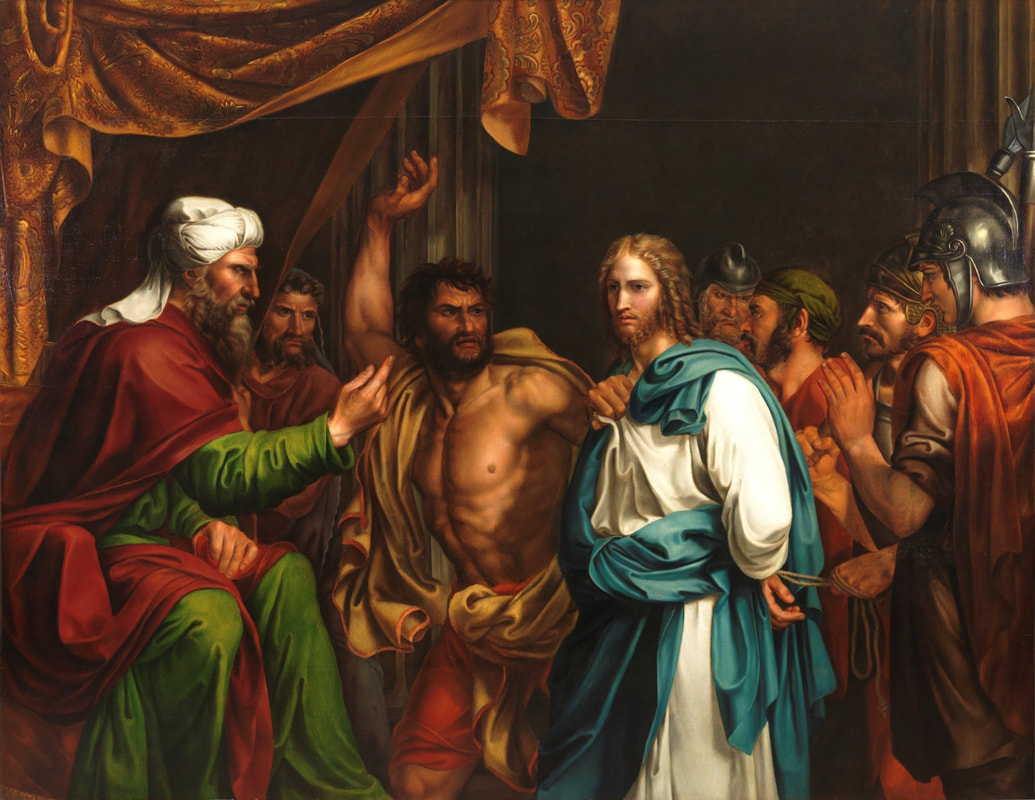|
Closing out part five of The Lord, we finally arrive at the trial and death of Jesus. And something about what we read about this in the Gospels ought to make us all horrified. To be sure, the entire affair is horrific for many reasons; we are talking about a kangaroo court and the illegal death of the Son of God here, after all. But the specific way it played out reveals something terrible at the heart of man. It wasn’t merely a mob that condemned Jesus to die, nor was it a specific group of people like the Pharisees or the Sadducees or the Sanhedrin or the Romans. It was everyone together, in unison.
If there’s one thing man is incredibly good at, it’s finding reasons to hate other men. One need only take a cursory glance at a history textbook to realize this fact. Indeed, you see it even more readily by simply logging onto Facebook or Twitter and scrolling for a minute or two. Men are very adept at making enemies of each other. It is perhaps our greatest and most ancient talent (recall that it was in the very first human family that a murder took place, when Cain made an enemy of Abel). We love having enemies. It makes it easier to justify our own wickedness and inadequacies. “It’s not me, it’s their fault!” But in the trial of Jesus, we see an uncharacteristic unity of purpose and will—we see men putting aside their animosity toward one another for the sake of accomplishing their mutual end. And that end? Killing Jesus. Killing God. It’s not something I thought about much before, but in reading these two chapters I can’t stop thinking about it. The Pharisees and the Sadducees hate each other. The Pharisees are keepers of the Law, rigid traditionalists and ritualists. The Sadducees are skeptics and Hellenists, openly embracing Greek culture and utterly unconvinced and apathetic toward the Pharisaic impulse to Holy Law. They each vie for control of the populace, wishing to exert their influence. They are old rivals. This is even more true of the Romans. The Romans are conquerors and occupiers, illegally trespassing on rightfully-Jewish land. They are cruel to the people, and the people hate them for it. If you have never read ancient historians like Josephus or Eusebius, I would highly recommend it, as they (especially Josephus) write a fair amount on this topic. It is not only the people, however. The Pharisees hate them perhaps even more. The people hate them for being cruel, and for imposing unfair taxes. The Pharisees hate them because they spit on the Jewish religion and claim to the Holy Land, by their very presence. The Romans are both a political threat and a religious outrage. To the Romans, the mob are an unruly nuisance to be quelled, and the Pharisees are fuel to the mob’s flame. Even the particular rulers of the day hated each other. Pilate and Herod were no friends of each other. They were rivals, each trying to assert his control and influence above the other. And yet when Pilate so gleefully sends Jesus to Herod, as Pilate sees this as a way to escape having to deal with the “Jesus problem” himself, Herod finds it to be a gesture of good faith and respect. We’re told in the Gospels that Herod and Pilate became good friends from that day forward, all because they found a common enemy to hate more than each other—that is, God. This is a completely ridiculous mass of people. We should never expect them all to be together at once. But in this moment, they stand united in their hatred and sin in order to reject God. To put Christ on the cross, they will put aside all other quarrels and concerns. It’s horrifying to realize that the one thing which seems to bring man together is our rejection of God. In an ultimate sense this is of course not true. The only thing which unites man to anything, including his fellow men, is God alone, the source from which everything comes and the thing that sustains everything in existence at all times. There can be no true unity without first clinging to God. But in the immediate sense, we see the depth of man’s sin is so great, the level to which we have fallen is so far, that everything we fear and hate and care about goes by the wayside for the sake of our united rejection of God. If anyone is to say we are not responsible for Adam’s sin in the Garden, this seems a damning counterpoint. That is the fact of things. Not just Adam, not just the Pharisees, not just the Romans or the mob. We all, with one voice, have rejected Christ. Thus we must earnestly and fervently repent and pray that the Spirit transform our hearts, so that we are not so easily drawn into such evil again.
0 Comments
Leave a Reply. |
Series Info
Every day of Lent, I am writing a reflection piece on two chapters of "The Lord" by Romano Guardini. If you'd like to read or follow along, you can find the full calendar of where we're at below, or Click Here for the main landing page. Archives
April 2020
Categories
All
|

 RSS Feed
RSS Feed